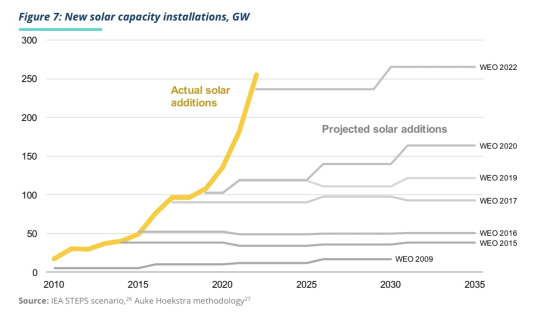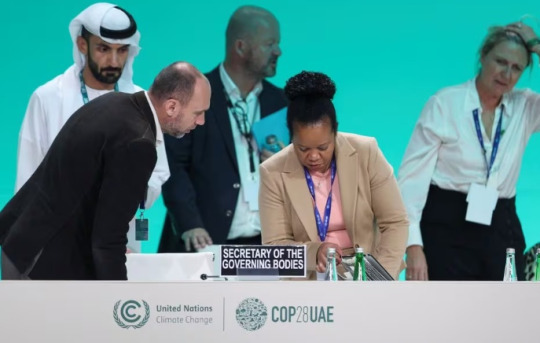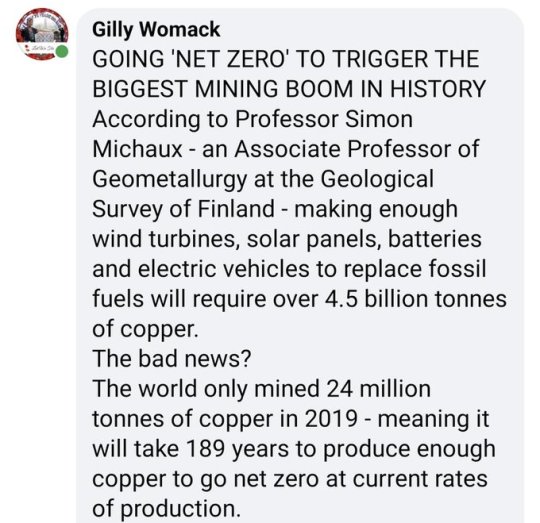#net zero
Text
"A net-zero power system is closer than we think.
New research, published by RMI, indicates that an exponential surge in renewable energy deployment is outpacing the International Energy Agency’s most ambitious net-zero predictions for 2030.
That’s right: Surging solar, wind, and battery capacity is now in-line with net-zero scenarios.
“For the first time, we can, with hand on heart, say that we are potentially on the path to net zero,” Kingsmill Bond, Senior Principal at RMI, said. “We need to make sure that we continue to drive change, but there is a path and we are on it.”
And that’s really good news.
Exponential growth in renewable energy has put the global electricity system at a tipping point. What was once seen as a wildly daunting task — transitioning away from fossil fuels — is now happening at a faster pace every year.
Based on this new research, conducted in partnership with the Bezos Earth Fund, RMI projects that solar and wind will supply over a third of all global electricity by 2030, up from about 12% today, which would surpass recent calls for a tripling of total renewable energy capacity by the end of the decade.
Global progress in the renewable energy sector
China and Europe have been leading the way in clean energy generation, but the deployment of renewable energy has also been widely distributed across the Middle East and Africa.
Research from Systems Change Lab shows that eight countries (Uruguay, Denmark, Lithuania, Namibia, Netherlands, Palestine, Jordan, and Chile) have already grown solar and wind power faster than what is needed to limit global warming to 1.5°C, proving that a swift switch to renewable energy is not only feasible — it’s entirely achievable.
In order to make that switch, globally, wind and solar need to grow from 12% to 41% by 2030. Denmark, Uruguay, and Lithuania have already achieved that increase in the span of eight years.
Meanwhile, Namibia, the Netherlands, Palestine, Jordan, and Chile have grown solar and wind energy at sufficient rates for five years...

The economic impact of climate progress
Not only is this an exciting and unprecedented development for the health of the environment, but this rapid transition to clean energy includes widespread benefits, like jobs growth, more secure supply chains, and reductions in energy price inflation.
This progress spans both developing and developed countries, all driven to accelerate renewables for a number of different reasons: adopting smart and effective policies, maintaining political commitments, lowering the costs of renewable energy, and improving energy security.
And with exponential growth of clean energy means sharp declines in prices. This puts fossil fuels at a higher, uncompetitive cost — both financially and figuratively.
RMI suggests that solar energy is already the cheapest form of electricity in history — and will likely halve in price by 2030, falling as low as $20/MWh in the coming years. This follows previous trends: solar and battery costs have declined 80% between 2012 and 2022, and offshore wind costs are down 73%."
-via Good Good Good, July 12, 2023
Let me repeat that:
For the first time in history, we are on an actual, provably achievable path to net zero emissions
#electricity#renewable electricity#renewable energy#net zero#climate crisis#fossil fuels#wind power#solar power#battery technology#uruguay#denmark#lithuania#namibia#netherlands#palestine#jordan#chile#global development#good news#hope
353 notes
·
View notes
Text
People rallied in front of SaskPower headquarters in Regina Friday, calling for the province to move toward 100 per cent clean electricity and net-zero emissions by 2035.
"We are one of the only provinces that are saying we can't do this and everyone else is working toward that goal," rally co-organizer Sydney Taylor said.
She noted the timing of the rally, planned weeks ago, turned out to be perfect after the federal government announced draft regulations on Thursday for a net-zero emission electrical grid by the year 2035.
Continue Reading.
Tagging: @politicsofcanada
28 notes
·
View notes
Text
Climate Scam
“The Man made Climate change narrative is merely a pre-text to install a new form of communism”
“If you want to control the people you have to control the Co2”
Listen to Dutch MEP Rob Roos issue a dire warning to the West
“If you have Digital Identity, connected to a CBDC then you have ‘Chinafication’”
#Climate Scam#Co2#net zero#Rob Roos#Dutch#CBDC#DigitalID#digital identity#social credit Score#communism#globalistagenda#globalcommunism
11 notes
·
View notes
Text
#we shall see#science#cars#automobiles#electric cars#zero emissions#carbon zero#canada#climate change#carbon reduction#carbon emissions#net zero
9 notes
·
View notes
Text

M0.0NSHOT (Very proud of this one)
22 notes
·
View notes
Text
By John Feffer
Common Dreams Opinion
Sept. 20, 2023
The rich cannot be allowed to sit on their billions while the planet burns.
Read more.
#wealth inequality#fossil fuel emissions#global south#climate change#climate crisis#net zero#sustainability
14 notes
·
View notes
Text
youtube
#wizardpostingn't#climate crisis#climate change#politics#world politics#net zero#global politics#global warming#health#Youtube
4 notes
·
View notes
Text
4 notes
·
View notes
Text
Fossil fuels are not just terrible for the planet, they are bad for democracy. A disproportionate number of major oil and gas exporters are autocracies such as Russia, Iran, Saudi Arabia, and Venezuela.
Russia in particular uses fossil fuel sales to fund repression at home and imperialism abroad.
Putin appears weaker than ever – and for a ruler who relies on projecting strength, that’s a bad look. To further dull Putin’s fading aura of invincibility, and to ultimately lead to a reversal of Russia’s invasion of Ukraine, we need to undermine the pillars his strongman myth is based on: colonial conquest, unregulated capitalism and climate abuse. As questions are raised about his ability to rule, Putin will claim that despite the efforts of the nefarious “collective west”, the Russian economy can stabilise because the world needs Russian fossil fuels; that the need of western companies to make money in Russia means it will never be truly isolated; that for all his blunders on the battlefield, he can still hold on to swathes of Ukraine and its resources, which he will dole out between the Russian system’s stakeholders for whom the risk of sticking with Putin will thus still be smaller than the risk of going against him.
No matter what the source of the oil or gas we consume, we push up the international price of those commodities whenever we use them. It's supply and demand; when we reduce our demand, the price goes down and dictators/theocrats get lower profits.
We need to recognise the fact that human rights, security and economic ties are deeply intertwined, and to alter our behaviour accordingly. Let’s stop selling dictators the rope with which they hang people: our neighbours – and ultimately us. And if there’s one base element that powers Putin’s claims to invincibility, it’s reliance on fossil fuels. The battle against Putin is also the battle against climate crisis. As Prof Alexander Etkind lays out in his new book, Russia Against Modernity, Putin’s economy has been up to two-thirds dependent on oil and gas exports, largely to Europe, and crucially through pipelines that cross Ukraine.
Etkind argues that Putin launched his invasion in part to control this flow. Moreover, he wanted to destabilise Europe, flooding it with refugees and instilling so much chaos and fear that Europe would be forced to abandon plans for net zero carbon emissions by 2050. As so often in the course of this war, Putin’s aims have backfired. The invasion has led to a decrease in dependence on Russian energy. Putin’s aura of fossil-fuelled invincibility has been shaken, but we are only part of the way there. Faster decarbonisation is the most sustainable way to not only undermine Putin, but also to limit the opportunity for future Russian leaders and other resource-rich authoritarians to wage aggressive wars.
Decarbonization is also de-Putinization. We contribute to peace and stability when we lessen the amount of fossil fuels we consume. And, of course, we slow down and eventually halt the warming of our planet.
Using these late 19th century sources of energy encourages despotic autocracies while making Earth less livable. It's time to say до свидания to fossil fuels.
#fossil fuels#climate change#invasion of ukraine#dictatorships#autocracies#theocracies#russia#vladimir putin#decarbonization#net zero#peter pomerantsev#alexander etkind#human rights#stability#россия#владимир путин#путин хуйло#диктатура#самодержавие#ископаемое топливо#изменение климата#союз постсоветских клептократических ватников#руки прочь от украины!#геть з україни#вторгнення оркостану в україну#україна переможе#слава україні!#героям слава!
13 notes
·
View notes
Text
COP28 countries reach landmark deal to “transition” away from fossil fuels
The COP28 climate talks in Dubai have culminated in a historic agreement that will see the world phase out all fossil fuels for the first time.
The president of this year’s UN-organised summit, Sultan Al Jaber of the UAE, brokered an agreement that was strong enough for the US and the EU on the need to sharply curb the use of fossil fuels while keeping Saudi Arabia and other oil producers on board.
The final agreement calls for countries to phase out fossil fuels from their energy systems in a swift and orderly fashion, which helped convince sceptics. The agreement also calls for countries to contribute to the global transition effort – rather than explicitly forcing the transition on their own.
The so-called “UAE Consensus” ends the hottest year on record, which led to droughts and devastating wildfires. Al Jaber, who’s also chief executive officer of Abu Dhabi National Oil Co, noted:
“Together we have confronted the realities and sent the world in the right direction.”
Read more HERE

#world news#world politics#news#current events#cop28#cop28 climate summit#cop28climateconference#climate catastrophe#climate emergency#fossil fuels#global warming#climate change#cop 28#net zero#climate crisis#climate action#climate emissions#emissions reduction#carbon emissions#co2 emissions#greenhouse gas emissions#fossil fighters#oil and gas#crude oil#natural gas
2 notes
·
View notes
Text

16 notes
·
View notes
Text
6 notes
·
View notes
Text
youtube
Why I Went With Geothermal For My Net Zero Home. In a recent heat pump video I covered how air source heat pumps are getting so much better in the cold, but in my new house I decided not to go with one. Instead I went with the more expensive option: a geothermal heat pump. Why did I decide it was a better option to drill into the earth 400 hundred feet at more cost for my new home? I’ll run through that, but there’s also a few other things I kind of went a little nuts on in my house that are worth touching on too, like smart electric panels, a crazy home network, and more. Let’s get into the current state of my net zero energy home.
Watch Wow! I Didn’t Know A Prebuilt House Could Do This • Wow! I Didn’t Kno...
Video script and citations:
https://undecidedmf.com/why-i-went-wi...
Get my achieve energy security with solar guide:
https://link.undecidedmf.com/solar-guide
Follow-up podcast:
Video version - / @stilltbd
Audio version - http://bit.ly/stilltbdfm
#Undecided with Matt Ferrell#solarpunk#premade house#prebuilt house#net zero#net zero house#Geothermal#Geothermal heating#sustainable#sustainablity#Geothermal heat pump#Youtube
3 notes
·
View notes
Text
Carbon dioxide removal is not a current climate solution — we need to change the narrative
35 notes
·
View notes
Text
One would not know it from the Democratic obsession with a “just transition” away from fossil fuels, but America’s contribution to global greenhouse gases is relatively small and has fallen rapidly over the past two decades. In other words, even if the US achieved Biden’s unrealistic decarbonisation goals, most global greenhouse gas emissions would be unaffected.
Politicians are always vulnerable to the tendency to try to promote multiple unrelated goals with a single piece of legislation. Franklin Roosevelt’s National Recovery Act (1933) had good elements, but collapsed because it tried to stimulate the depressed economy and restructure American industry at the same time. With the IRA, Biden and congressional Democrats indulged in a similar temptation. Here, just one piece of legislation was supposed to accelerate the “green transition” away from fossil fuels to Net Zero, onshore manufacturing supply chains that have been lost to China and other countries, create great numbers of well-paying new jobs, revitalise “left-behind” local communities, and promote racial and gender “justice”.
2 notes
·
View notes
